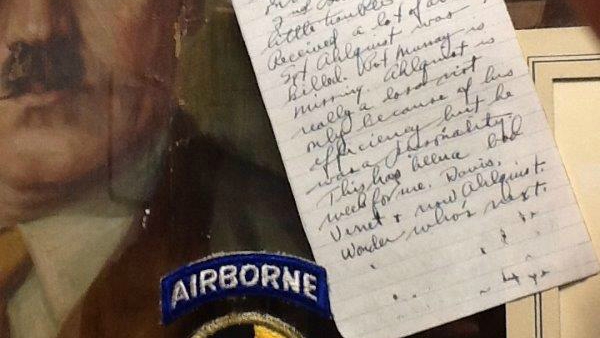>>> Update adds judge’s comments in televised interview.
An Oregon judge is fighting an investigative panel’s accusation that by declining to perform same-sex weddings on religious grounds, he violated both the state’s constitution and code of conduct for judges.
This and other allegations could result in the judge’s suspension or removal from office.
However, a close friend of two decades told The Daily Signal that the charges are “hogwash.”
Vance D. Day, one of 14 judges on the Marion County Circuit Court in Salem, Ore., readily admits that he asked an assistant not to schedule him for same-sex marriages but instead to arrange for another judge to officiate.
Performing the marriage of two men or two women “conflicted with his firmly held religious beliefs,” Day told the Oregon Commission on Judicial Fitness and Disability.
Those beliefs, Day said in papers responding to the commission’s complaint, are “rooted in the Judeo-Christian tradition that defines marriage as between a female and a male.”
Appearing Sunday morning on Portland TV station KATU, Day told “Your Voice, Your Vote” host Steve Dunn:
There’s nobody I know of that’s ever been denied having a wedding ceremony in Marion County because of my actions. … I have nothing against gay and lesbian couples at all.
The judge’s complete interview about the charges takes up the first half of this KATU video:
In allegations to be aired in a public hearing Nov. 9, the judicial panel says Day “inappropriately screened and ordered his court staff to screen wedding applicants to ensure they were not same-sex applicants, because [he] refused to marry same-sex partners even though they could lawfully marry under Oregon law.”
A federal judge’s ruling legalized same-sex marriage in Oregon in May 2014, more than a year before a 5-4 decision by the Supreme Court legalized it across the land.
Day admits arranging for staff to connect same-sex couples with another judge, spokesman Patrick Korten said, adding that Day decided to stop officiating at all marriages about a year ago.
“It suggests the length to which those who favor same-sex marriage are willing to go to coerce people not merely to accept it, but embrace it,” Korten, a former Reagan administration official hired by Day, told The Daily Signal about the allegations against the judge.
“We’re trying to make sure the public understands what the charges are, how weak they are, and what the judge’s response is,” he said.
>>> For more on religious liberty and same-sex marriage, see Ryan T. Anderson’s new book, “Truth Overruled: The Future of Marriage and Religious Freedom.”
Under Oregon law, judges are permitted to perform marriages but are not required to do so. The Statesman Journal reported that Day, who had not been asked to do a gay marriage, is not on a list of six Marion County judges available for wedding ceremonies.
Day said on KATU:
As a judge in Oregon … it is not my obligation, it’s not part of my job description, it’s not my duty to marry people. We have a very lax standard here in Oregon. I mean, heck, you go on the Internet, pay nine [or] 10 bucks and you too can marry people. … Judges recuse themselves from actual duties all the time.
‘Serious Questions’ or ‘All Hogwash?’
Jeana Frazzini, co-director of Basic Rights Oregon, said Day’s decision not to perform any marriages is troubling.
“Taking that kind of a step really calls into question how an LGBTQ person could expect to be treated in a court of law,” Frazzini told Associated Press. “It goes beyond marriage and gets to serious questions about judicial integrity.”
The allegation that Day’s faith-based view of marriage suggests he is unfit to serve as a judge is one of 13 counts the judicial fitness panel issued secretly June 23. His supporters, however, regard the same-sex marriage claim as the heart of the case and suggest opponents, not the judge, are being intolerant.
“That’s all hogwash,” retired Oregon real estate developer Duane Rawlins said, asked about the main points of the complaint in a phone interview Saturday with The Daily Signal. “That’s so far from the true character of this wonderful gentleman.”
Rawlins, 86, who describes himself as a close friend of Day’s, said the judge is “fair” and “unprejudiced.” He added:
He’s never done anything in my presence that would suggest he’s not comfortable being around a gay person. … He just doesn’t believe in gay marriages and chooses not to do that. And I don’t know how you can [punish] him for that.
He always appreciates the uniqueness of each person and each person’s right to have their own opinion.
I just can’t imagine anybody being able to … remove him from his judgeship on such flimsy, unconstitutional, lousy charges. I just go, ‘ Wait a minute, am I still living in America?’ The same people that feel so abused want to turn around and abuse someone else. That doesn’t make sense to me.

Judge Vance Day arranged for this exhibit honoring military veterans to be hung in the Marion County Courthouse. (Photo courtesy Vance Day)
Because of the confidential nature of the proceedings so far, it isn’t clear who complained about Day to the Commission on Judicial Fitness and Disability. The commission’s findings will go to the Oregon Supreme Court, which the law empowers to censure, suspend, or remove a judge of any court for wilful misconduct.
Citing ‘Sincerely Held Religious Belief’
Day, in his mid-50s, practiced law in Salem for 20 years. He served as chairman of the Oregon Republican Party from 2005 to 2009. In 2011, then-Gov. John Kitzhaber, a Democrat, appointed Day to the bench. He won election in 2012.
“He is clearly and quite obviously a sincere American patriot, he’s a very intelligent attorney and judge, and he understands exactly the constraints he must operate under,” Korten, a media and crisis consultant, said in an interview Friday from his Virginia office.
Korten said Day denies all 13 counts and contends that the commission applied rules in a way that violated the judge’s constitutional rights to freedom of speech, association, and religion. The judge denies that any of his described conduct breaks state ethics laws and seeks dismissal of all charges.
In the counterclaim, lawyers for Day said he accepted public requests to perform weddings from late 2011 until early September 2014. He reconsidered after U.S. District Judge Michael J. McShane struck down Oregon’s definition of marriage as between a man and a woman, the document says:
Judge Day has a sincerely held religious belief that same-sex marriage violates the [tenets] of his faith. Due to his religious convictions, Judge Day sought to recuse himself by requesting that his judicial staff direct same-sex couples to another … judge who was available to perform same-sex ceremonies.
Korten, whose federal career included a stint as a top public affairs officer for Attorney General Edwin Meese, said he has not yet met Day but has had daily telephone conversations with him for the past two weeks.
The commission’s specific charges and the judge’s responses may be found in this document supplied by Korten.
The allegations became public earlier this month when Day sought, and won, permission from another state panel to set up a defense fund to cover his legal expenses. Normally such a complaint would not be made public until two weeks before hearings begin. Portland TV station KGW first reported the investigation.

Detail from the display of World War II memorabilia including a portrait of Adolf Hitler. (Photo courtesy Vance Day)
Summary of Charges
In a press release Sept. 8, the nine-member commission specified allegations that Day violated Oregon’s constitution and its code of conduct for judges, using these words:
-
by submitting a false statement to the commission, in connection with an investigation of complaints about him, that he was grabbed by the shoulders from behind without warning while attending his son’s soccer game;
-
by falsely claiming that he did not know that a veteran in Veterans [Treatment] Court, over which he presided, had a felony conviction;
-
by permitting that veteran to handle firearms when the judge lacked authority to waive the statutory prohibition against a felon having or handling a firearm;
-
by hanging a picture of Hitler in the Marion County Courthouse;
-
by collecting money from lawyers, some of whom appeared before him in court, to sponsor veteran-related wall hangings in the courthouse hallways; and
-
by screening, or having his staff screen, wedding applicants to ensure that they were not same-sex applicants, which he refused to marry before he discontinued presiding over weddings.
Susan D. Isaacs, executive director of the commission, said in an email Monday to The Daily Signal that she could not comment beyond the press release.
At one point in Day’s counterclaim, the judge’s lawyers write: “The commission did not perform its investigative, prosecutorial, or deliberative duties in good faith, but instead charged Judge Day with some violations even after clear and convincing evidence of his innocence was provided to the commission.”
‘A Picture of Hitler’
In the interview with The Daily Signal, Korten called the commission’s press release “a remarkable document” that on its face is “jarringly unfair”–in particular the phrase “hanging a picture of Hitler.”
Day, he said, instructed his staff “to politely and in as kind as possible a way to say, ‘Judge Day doesn’t perform same-sex weddings but here is a list of judges who do.’ ”
Writing as Day’s spokesman, Korten summarized the case this way:
The commission complaint covers four groups of charges: a long-ago dismissed complaint about his conduct at several soccer games in which his son was playing; various allegations involving a Navy veteran whose case Judge Day oversaw in his capacity on the Marion County Veterans Treatment Court; complaints about photos and other displays on the walls near his office; and his decision to recuse himself from performing same-sex marriages.
The soccer incidents were the subject of an identical commission complaint in 2013 and were dismissed.
The [allegations about a] Navy veteran of SEAL Team Six involved two very brief instances in which the veteran handled an unloaded pistol in Judge Day’s presence.
The wall displays fell into two categories: an exhibit of war memorabilia designed to honor the military service of all veterans, and pictures of former [Republican] presidents of the United States.
Korten said the original painting of Hitler was confiscated by a local World War II veteran, a regimental surgeon with the 82nd Airborne who found it hanging on a wall as Allied forces advanced through Nazi Germany. The portrait formed part of the backdrop of a courthouse display of memorabilia that Day had arranged to put up.
If using part of an image of Hitler to honor a veteran who sent it home from the war that defeated the brutal tyrant violates Oregon’s constitution and code of judicial conduct, Korten said, “almost anything could be construed to be a violation.”
What’s Ahead
In scheduling the first hearing for Nov. 9, the judicial fitness panel set aside up to nine more days for the case.
If the commissioners conclude Day violated the state’s constitution and Code of Judicial Conduct, they will recommend “an appropriate sanction” to the Oregon Supreme Court. The panel may recommend dismissal of complaints where it finds no “clear and convincing evidence.”
The Oregon Supreme Court makes the final determination on the commission’s formal complaints against a judge, after briefing and oral argument based on the hearing record. Depending on its findings, the court could censure, suspend, or remove Day.
Day, represented by a Salem law firm, also retained constitutional lawyer James Bopp, general counsel at Madison Center for Free Speech in Indiana.




























